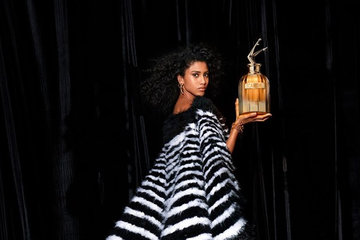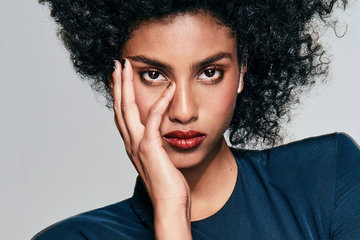
There are so many things to admire about actress and singer Kristen Bell, who made a name for herself in series like “Veronica Mars” and “Gossip Girl.” The Michigan native, who stars in the recent comedy “The Boss,” is amicable, delightful, fun and completely passionate about what she believes in. Those strong views, as well as her glowing, dewy skin make Bell the perfect Neutrogena ambassador. Roula Allam talks to the 35-year-old Tisch School of the Arts graduate about the skin care brand’s ‘See What’s Possible’ campaign, women cooperating and the principles she has in common with the American company. The dynamo also talks about other topics close to her heart, how goofy is good, what she wants her kids to learn from “Frozen” and beauty coming from the inside out.
Looking back at the Veronica Mars series (2004 – 2007) and the Veronica Mars the movie (2014), you almost look the same: fresh faced and radiant. What’s your secret?
Well, good genetics to be honest, but I think my secret is I enjoy taking care of myself. I have always taken good care and paid attention to what I put in my body. I like to love myself and to me it’s a meditative experience to nurture myself, whether it’s eating as many vegetables as I can or taking care of my skin. I have good skin because I take care of it.
You mention eating a lot of vegetables, so food is obviously an important part of your beauty regime as well.
Extremely, I think what you put in your body, you will get out of your body. I think eating healthy is 50 percent of having good skin. I think your skin needs omega oils, nutrients and vitamins, and I receive those from a good, healthy balanced diet.
You’re talking about a vegetarian diet...
For me, it’s the right decision. I don’t think everyone needs to be a vegetarian or vegan. Then again, I think you should listen to your body. But I do think eating less meat is not just good for your body, it’s also good for the planet. Processed meats in particular have just been identified as Group 1 carcinogens along with asbestos, and I have no desire to eat asbestos. My family eats meat, and when I prepare it, I make sure I’m buying from responsible, humane farms that use practices like rotational grazing. There are a lot of ways you can produce healthy food, and I research that and make sure I’m buying from sustainable, healthy farms.
What’s your approach to day-to-day beauty and how do you prepare for red-carpet events?
A lot of sleep the night before if I can, I think every step leading up to a big event is important. I always take my make-up off the night before, I never go to bed without washing my face. For me, it’s somewhat of a ritual, it’s a gift I give myself. I always make sure I cleanse and moisturise my skin so it can rejuvenate while I’m sleeping and give me a better palette in the morning. I don’t take short cuts there. I also think exercising and keeping my endorphins up makes me feel really good and gives me a nice glow.
Plus, I always use sunscreen. I think that particularly affects how youthful your skin can look and I wear that everyday and try to stay out of the sun. Neutrogena has these sticks I always keep in my purse. They’re face and body sticks, I have them in my purse for the kids and for me. It’s just an easy way to apply sunscreen anywhere. Often when I’m driving I’ll rub them on hands if I’m sitting through traffic. The California sun is always sharp and hot.
They would come in handy here in the Middle East, that’s for sure.
Yes!

You have been a Neutrogena ambassador since 2011; how has your collaboration evolved with the brand?
Well, I became an ambassador because I love the products and my views align with the company’s views. Neutrogen Naturals offers natural products that don’t skimp on their efficacy. I want products that are natural and also work. Plus, Neutrogena is often participating in national and international converstations that are important to me about conserving water resources, especially here in California, where we are in a severe drought.
There’s one we are doing right now about encouraging women. I think we have a responsibility to create a good environment for younger woman, and the ‘See What’s Possible’ campaign encourages women to love themselves and to take small steps to achieve a bigger goal. I think it’s important to remind women we’re on the same team and that we’ll achieve more if we cooperate as opposed to compete.
So is that how you see the meaning of the ‘See What’s Possible’ campaign?
Yes, I think the possibilities of the campaign are endless. It’s a conversation that all women should be having all the time. Women are special, we have many, many qualities that for years and years have been identified as weaknesses, and I believe they are strengths. Women’s particular navigation of empathy and sympathy, it’s important.
Remembering we’re on the same team is first and foremost, continuing to push ourselves and see what we can achieve and surprise ourselves it’s juts necessary. I think we have a duty to each other. I have daughters and I want them to believe in themselves. I think reminding women, who can often struggle with low self-esteem, that self-esteem can only come from within and you have to love yourself is particularly significant. And I feel that’s what Neutrogena is trying to do. They believe it’s their job to encourage women to put their best faces forward so that when they look in the mirror they feel confident and they feel that anything’s possible.
There’s a lot of debate of late about the challenges for mature or ageing women in the workplace, and that includes actresses in Hollywood. How do you stay ‘relevant’?
I always try very hard; I’m a fighter. I think relevancy comes when you find why you’re unique. If you can figure out what makes you different, you’re immediately irreplaceable, but if you fall in line with everyone else, you’re irreplaceable in an instant. I don’t know how relevant I am because I don’t often consider it, but I know what makes me unique. I’m maybe goofier and weirder and talk more than most elegant women, and I love that about myself. I have strange interests but they’re my interests.
In essence, you’re saying the most important thing is to be yourself and offer something that’s unique.
Yes, and you know that was the beauty of the message in “Frozen,” and I believe that why it was so successful. Elsa was denying what makes her unique, she was denying what makes her different, she was embarrassed by it. I think that’s why it spoke to so many people and it’s a perfect example of when you enjoy what makes you different and you love yourself, anything is possible.
Talking about “Frozen,” you recorded the lines for fearless Anna in the cultural phenomenon. What do you want your children to learn from the character?
I want them to know there’s not one definition of a princess. A princess is anyone who believes in herself and sees why she is special. Anna is a very atypical princess and when we were creating her, it was my goal to make her different, to create someone I would have looked up to and related to when I was little. I was a very awkward little girl. I talked often to my dog. I didn’t have good posture, I would leave my mouth open and I drooled in my sleep, I still do. I suppose I want my girls to know all those things are OK.
You come from a big family. What kinds of things do you get up to with your own sisters?
I have two sisters and the three of us could not be more different. It was wonderful, we rarely shared the same interests for longer than a week and it allowed me to realise there are many different people in the world who are loveable, because I love my sisters so much. Yet I didn’t love them because we had a lot in common, I loved them because they were my sisters. And we got into tons of trouble together as kids. I mean they used to send me down the stairs in a laundry basket, we would make rollercoasters and always get busted, it was wonderful.

You mentioned spending lots of time with your dog before. Tell us about how you became interested in animal rights.
I think a lot of great thinkers have said many great quotes along the lines of character can be judged by how you take care of the things around you. I believe in helping the weak and the vulnerable. I think we were given two hands for a reason, one for yourself and one to help others and for me children and animals are the weaker and more vulnerable.
There are a lot of misconceptions about animals and animal welfare. Every dog I have adopted has been a shelter dog. Some people think dogs in a shelter are violent or aggressive, and I’m working to squash those stereotypes because there are millions of dogs in shelters that need homes, so to me it’s inconceivable we would be breeding more animals when we are euthanising them on a daily basis. I don’t think it’s because people are heartless, I think it’s because they just don’t know. Information is power whether it’s about a shelter dog, acknowledging there’s a lot of inhumane treatment in factory farming and working to pass bills to change that or recognising farm practices that are healthy and responsible in the way they care for the animals and consider the quality of life. I think it all adds up to better karma for the planet. If you are consuming meat of a farm animal that’s had a terrible, stressed out life, I can’t imagine it would be very healthy. I just think karmically, we can all be a little nicer and more responsible. Not everything is about cutting corners and mass producing. I think we’ve lost sight of our responsibilities as human beings but I think we can get it back by re-educating what’s good for ourselves and what’s good for our planet.

















